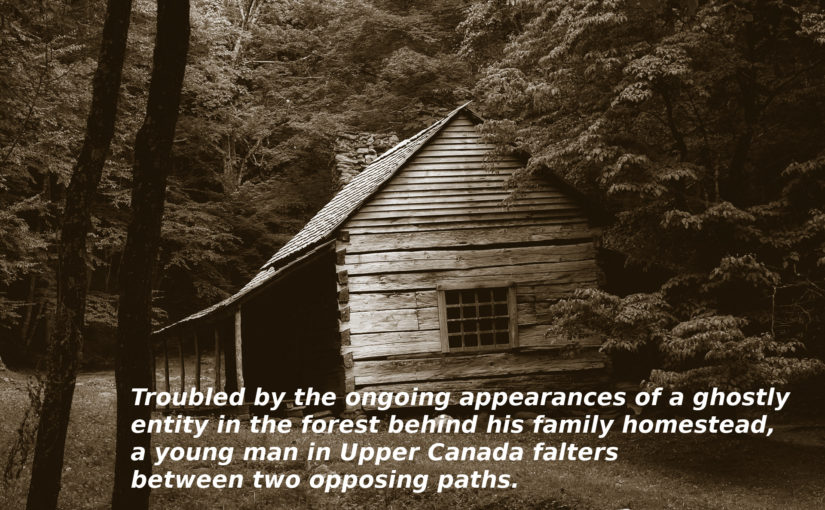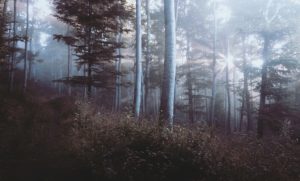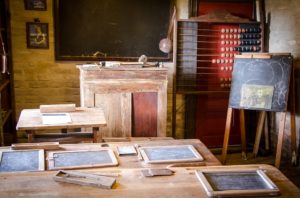It happened in the hour before the first rays of dawn, in spring. I’d been lying awake and silent for about ten minutes, having awoken to the sound of movement outside—and was trying to decide whether or not to investigate. The padded footfall seemed too heavy for a deer and I wondered if it might be a black bear. But Pa was snoring softly in the next room, oblivious, and I didn’t want to wake any of the children, so I decided that so long as it didn’t go near the stable or barn, or attempt to get in the cabin, I would leave it be.
Staring through the glass window panes above me at a smattering of stars, ears strained, the footsteps drew closer till I sensed it was within a few feet of the log wall beside me. I held my breath, limbs tense.
Then the window filled with white as some massive entity blocked out the sky.
Heart leaping into my throat, I threw back the quilt and gathered myself into a standing position as quickly and quietly as possible. Face pressed to the window searching, I blinked a few times at the view before me as the glass fogged up. But whatever it was had already moved out of sight, and all I could see was trees and a wedge of the field.
Leaving the bedroom, I moved around the table and benches in the main area, partly visible from the light of the smouldering fire, and reached up above the mantel to lift down the fowling piece. Tugging on my boots, I unlatched the door and shut it behind me with a slight creak and a click. My footsteps made a hollow sound on the porch as I hurried across it and took the steps down to the dirt. Though the specter or creature or whatever it was could have gone in any directon, I headed toward the field, looking back and forth wildly about me, and smelling the air for any hint of bear just in case.
Then I spotted the white creature again: trailing the side of the field, and nearly all the way to the distant treeline.
But this was no mist or phantom or ghost.
It was a bull moose.
A completely white moose, antlers and all.
Barely believing my eyes, I followed it all the way to the woods, loosing track of it in the darkness as branches and leaves crackled beneath my boots. Not wanting to scare it away by being too noisy, I crouched down beside a tree to wait; fowling piece hanging from my shoulder. Though the air was crisp, adrenaline had me sweating, and my nightclothes were damp against my chest as I tried to steady my breathing.
The light of dawn gradually permeated the forest as I lay in wait, giving it a celestial glow, and the moose stepped into view once again: he must have been close by all along, hidden by heavy tree boughs. So close, in fact, that I could see his brown eyes staring at me beneath sweeping lashes, and the faintest grey dots here and there beneath his breathtakingly white coat. Never in my life had I ever seen or heard of the existence of such an ethereal creature. Many a brown moose I had seen, but a porcelain one? How was this even possible?
With such a majestic prize standing before me, my thoughts flooded with mercenary zeal, and how proud father would be, how amazed—how amazed everyone would be.
The creature blinked, narrowing its eyes a little as though wary, and turned to one side, preparing to leave.
Pa’s fowling piece was already poised over my shoulder and held in hand. I must have prepared it instinctively, though I’d never shot anything before but small game. The moose began to move away and my heart pounded against my ribs: if it bolted I’d be out of luck and might not even see it again for another year.
The shots rang out before I even realized I’d pulled the trigger.
It fell to its front knees and collapsed forward, face smacking the forest floor before the rest of its body followed.
Taking tentative steps through undergrowth, I approached and knelt down beside it. His brown eye, looking to the sky, was glazed over now, and crimson rivulets weaved together in a trail down its chest; white fur glistening with a touch of sweat.
After all these years I’d not only confirmed, but had caught my ghost.
A shout sounded from the field. Pa had heard the shots and was coming after me. I met him halfway, panting with excitement and incoherently explaining what had happened. He followed me back to the kill site where I watched, beaming, legs spread and hands on my hips, as he examined the body. As expected, he was not only astounded but pleased beyond my greatest hopes.
Each of us taking the creature’s head and antlers in hand, we together dragged the body out of the forest and all the way down the side of the field to the barn, huffing and heaving. We had just reached the building when Mother came out of the homestead, calling our names.
We lowered its head to the dirt, which billowed beneath it, and watched as she came around the side of the cabin, adjusting her shawl about her shoulders as she marched, for it was chilly. At the sight of us, comprehension registered in her face within mere seconds, and she quickened her pace.
Dropping to her knees beside it, crestfallen, she cupped the ivory cheek in her hand.
“My angel,” she said, crying freely. “At long last you found this beautiful creature in the woods . . . and you killed it.”
I couldn’t bear to look at her, heart sinking to the pit of my stomach. Up until her arrival I’d been looking at the situation only one way. Now, vision clearing like a dispelled mist, I saw it from her perspective and it was though the air had been sucked from my lungs. My mouth opened but no words came out. What had I done?
Pa scowled with obvious annoyance. “Come on, son, let’s get going.”
Mother moved out of the way and we dragged the body into the barn, a few black drops of blood staining the dirt where it had lain.
The rest of the morning went by like a forceful gust of wind. After changing into day clothes and retrieving our felt hats, we rode horseback straight for the general store to describe our treasure to everyone there; taking eager orders and anticipating great gains. With such a valuable quarry, we knew word would spread rapidly throughout the area: there’d be a lot of work to do in the days ahead to prepare the body for distribution, consumption, and preservation. The otherworldly hide and antlers alone would be worth a great deal. During this time I was able to suppress the memory of Mother’s disappointment and dismay.
We returned home by noon and sat down at the table over lunch to discuss our plans and to divvy up the work between us. Ma served us pottage, a reserved expression on her pale face, and did not speak a word. The atmosphere was heavy—even the children were unusually quiet and somber. I avoided eye contact, swallowing down my guilt with each gulp of stew, and after eating we went back outside into the sunshine. Newly arrived robins were singing and hopping about, but all sense of cheer had left me.
We were nearly to the barn when my sister and two little brothers came running up the driveway together. “Ma, Pa,” they shouted. “Someone’s here—”
Sure enough, the sound of trotting hooves filled the air as two men riding horseback emerged from the tree cover.
A British soldier and an Indian chief.
Pa removed his hat and held it against his chest, and I did the same, heart pounding. I struggled to swallow and looked at my father for reassurance. But his face was blanched, eyes wide.
“Where is the white moose?” the soldier asked.
“Oh it’s uh, it’s in the stable.” Pa motioned behind him with a thumb. “But sir, we shot him right here on our own property, it don’t belong to nobody else.”
“Yes, granted you did, but that is not in question.”
The strangers exchanged a few sentences together in the dialect of the chief—who stared down at us with a furrowed, weathered face, and deep, steady eyes—and then the soldier explained to us why they had come.
We quickly learned that animals with white fur, being exceedingly rare, were sacred to the Indian people, and believed to be connected to their ancestors. Spirit animals, they called them. It was a bad omen to take the life of a spirit animal.
Having been in the vicinity of the trading post earlier that morning, the chief had heard about our kill minutes after we’d begun our journey back to the homestead. It did not take him long to collect a soldier and follow after us. Their intention was to respectfully request that the moose, in its entirety, be surrendered to the chief and taken to his people, where a ceremony would be held to honor the body and release it back to nature. The soldier, who’d come along to serve as a translator and mediator, as well as an authority figure, assured us that this was a request only and not a command, and that no bartaring was to be involved.
Mother stood on the porch watching us, the children hovering about her skirts, and her face in shadow. But I didn’t need to see her expression to know what it was. Nor did I need to ask to know what she might say. I had always known what she thought and how she felt, but had chosen to ignore and belittle it in favor of father’s society.
The color had returned to Pa’s face by now, cheeks ruddy and his brow drawn. His hat was back on his head and I could tell that he was angry. We stepped aside to discuss the proposition in an undertone. He was unwilling to relinquish what was certain to be a small fortune, and fully expected me to agree. But because it was my spoil, he acknowledged, with great reluctance, that the decision was rightfully in my hands.
I looked over at Ma and the children . . . then at the soldier and the chief . . . then at Pa. My hands trembled slightly with nervous tension, nausea rising in my throat. Memories swept over me like a cold draft, memories of all the mysterious sightings over the years. The moose had been wise to keep its distance. It would seem that just as I had gradually lost my fear of it over the years, benumbed into a state of complacency, it too had shed its fear and taken the risk of coming too close.
That risk had cost it its life. What had it cost me?
I stepped away from my father and approached the two men, lifting my chin a notch; hat still in the palm of my hand at my side.
“You can have the moose.” My voice sounded distant, diminutive.
Pa gasped audibly and began to rant but I paid him no mind. Instead, I led the men into the barn and assisted them with the body, which we proceeded to lay in the back of the empty grain wagon. After he had cooled off, Father assisted with this task too, albeit begrudgingly, and we readied and harnessed our own horses to the wagon. He then climbed up onto the bench beside me. At this juncture Ma approached at last, hair pulled up in a bonnet, cheeks glinting with silent tears. She smiled up at me with peace and gratitude: a most tender smile that I had not seen since my earliest years. Was it because she’d long ago ceased to give me that particular smile or only that I’d stopped seeking it?
I knew in that moment that she was proud of me, that the disconnect between us had been inexplicably reversed and our bond renewed. At the same time a crevice had opened between Pa and me, a crevice that might one day be a canyon.
Returning her smile with humility, I let out a sorrowful sigh and picked up the reigns, overly conscious of the innocent creature behind us in the wagon, destined to lie still and silent forevermore. I couldn’t undo the lethal choice I’d made early that morning, but I could make things right henceforward. After releasing this spirit animal back to where it belonged, I would be returning to the homestead later that night, a new man.
Over the months that followed, my eighteenth year, I sensed the two halves of my divided self merging back together again as one.
I no longer joined father and his companions in the taproom to revel but instead retired to the inn after supper, to read or journal under candlelight, returning to the tavern only to ensure father’s safety if he’d had too much to drink. And as my cloven spirit knit itself back together, so too did I find womenfolk becoming one again as well. Whether lady or prostitute I would treat them all with the same respect and consideration that I bestowed upon my mother and sister. My father and many other men had chosen to view women through what I now considered to be a grossly mistaken delusion—a delusion I would strive to never fall for again.
On my nineteenth birthday, I laid the foundation for a one-room schoolhouse in a clearing I’d felled little by little only a mile from our homestead. Then, with the help of my younger brothers and cousins, we built that log building over the course of several months and had it ready to go by the close of fall harvest. Mother moved most of her collection of books and textbooks to the shelves I’d built along one wall, donating them to the school, and we held a fundraiser, a pooling of resources, to procure a woodstove, slate and slate pens, and a big chalkboard to mount on the wall. I built the desks myself, one by one, and my sister, now seventeen, was to be the teacher.
The very first school built within walking distance of two dozen children.
Later, after the first day of class reached completion, the children having been dispensed and now walking home together in various directions, I stood alone out front and stared up at my prize, feeling an overwhelming sense of joy and accomplishment.
I liked the man I had become and the sense of purpose and direction that now filled my life. The restlessness, the weight on my shoulders, the malaise—all of it long gone.
A movement sounded on the road behind me and I turned around expecting to see a lingering child. Instead, a white cow moose stood in the middle of the dusty road, staring at me.
I lowered my hat to my chest and held her gaze before bowing my head.
When I raised my eyes a moment later, she was gone.
The End.
Short stories licensed under Creative Commons Attribution-NonCommercial-ShareAlike. If you post these stories, please provide credit along with a link back to http://www.bekahferguson.com/
Names, characters, businesses, places, events, locales, and incidents are either the products of the author’s imagination or used in a fictitious manner. Any resemblance to actual persons, living or dead, or actual events, is purely coincidental.




I really enjoyed this! It reminded me of Little House on the Prairie, but with some mystery, surprise, and a good end!
Fantastic story. I really enjoyed it. Thanks!